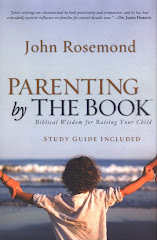Now, don't get me wrong - I'm all in favor of non-violent parental communication. Isn't the alternative called "child abuse"?
So much for Exhibit A, an excellent illustration of the parent-babble which John Rosemond so completely dissects in Chapter 4.
This chapter really struck a chord with me when the author spoke of parental confusion and the ensuing stress and anxiety. When I read Rosemond's litany of issues that confuse and stress modern day parents, I felt he was speaking directly to me. I can vividly remember when my oldest child was just an infant and I would hungrily consume any and every parenting book I could get my hands on, anxious for advice on how to survive the roller coaster ride I felt I was on at the mercy of this tiny human. (I have to wonder how high my own personal tower of parent-babble would reach.) Anyway, every so often I would find myself so utterly confused by the conflicting views and the impossible standards and the ridiculous assumptions that I would have to stop reading and listening and just do what I thought I should do. I have found my self repeating this pattern periodically throughout the years. If I had spent more time just doing and less time soaking in so-called advice, I probably would have been a lot better off.
I was also interested (in a horrified kind of way) by Rosemond's explanation of the shift that's taken place in the role of the father in child-rearing. After he profiles today's “Micromanaging Mom” (guilty!) he goes on to describe “The Incredible Shrinking Father”:
The typical modern father is on the periphery of child rearing. He has little if any decision-making power and even less disciplinary authority. As his wife orbits around the child or children, busily attending to ever-smaller bits of minutiae, the father stands outside the periphery of her orbit, awaiting instruction. He is, in effect, his wife's “parenting aide,” whose function is akin to that of a teacher's aide in a classroom. The teacher's aide doesn't really know the curriculum, and neither does Dad, and Dad, like the teacher's aide, is there to simply assist the “real” parent and fill in for her when she needs a break. Even then however, he can't be trusted to know what to do. He must be given a list of instructions. (pg. 109)
Ouch! This comes perilously close to describing my household. Now, Dan has always been an involved, hands-on father, but because I'm the one who reads the books and understands the psychology I tend to over analyze everything he does or doesn't do and criticize everything he says or doesn't say, treating him as if he's doing it all wrong because he hasn't read the latest book, when in fact, he's probably guided quite capably by instincts implanted by his own upbringing. I thought this "mom's in charge" pattern arose solely as the result of my being raised during the height of the feminist movement, but now I see that modern-day parenting "experts" have slowly but surely crafted this scenario over the past few decades. And I observe this beyond my own walls as well. It is abundantly clear to me just how detrimental this dynamic can be to the marital relationship, let alone to the next generation of kids who observes the frustrated mother emasculating the dad because he's clueless, as far as she's concerned, about “proper” parenting techniques, and the father, usurped of any authority, becoming one of the kids. Not healthy, not healthy at all!
Well, I don't know about you, but I'm greatly relieved that this wraps up Part 1. I've had about all I can take concerning all that I've done wrong so far, and I'm ready to move on to "Recovery." Looking forward to Chapter 5 this week - I'll check in next Monday.
Hang in there!
Eleanor
Romans 12:2







No comments:
Post a Comment